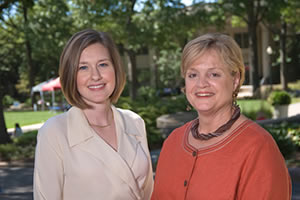Achievements
SPA PhD Grad Wins Volcker Award for Groundbreaking Research on Government Contracting

In today’s competitive job market, one might assume a poorly performing contractor would be sanctioned without a second thought. But groundbreaking research by recent SPA grad Amanda Girth has shown that managers are not so quick to hold government contractors accountable – and she intends to find out why.
To broaden the scope of her dissertation research on use of sanctions in local government contracting, the American Political Science Association Section for Public Administration awarded Girth the Paul A. Volcker Junior Scholar Research Grant. This prestigious national cash award honors and supports junior scholars researching public administration issues.
Girth’s latest research will delve into the reasons behind federal managers’ decisions to invoke contractual incentives – whether sanctions or rewards – in their contract oversight work. “This study fills an important gap in scholarship by shedding light on the critical decisions that public managers make as they administer contracts and how those decisions affect public accountability,” said Girth.
GAO reports exposing government agencies paying out award fees (monetary incentives) to contractors for unsatisfactory performance have recently brought Girth’s research topic into the public eye. “The findings have considerable financial implications. Agencies use contractors in part because it’s easier to replace them if their performance suffers,” said Girth. “But it is often more troublesome for the government to document and address performance issues than to just pay out the award fee.”
Having served as both civil servant and private consultant to federal agencies, Girth has experienced the “thorny implementation issues associated with contracting for public services” firsthand Girth worked in Michigan state government before going on to receive her MBA from The George Washington University. She was later a manager at BearingPoint, a global management consulting firm, and in August received a PhD in public administration from the School of Public Affairs.
The current study is an extension of Girth’s dissertation research, for which she received the Ann and Neil Kerwin Doctoral Fellowship. For her dissertation, Girth conducted interviews and a national survey of city officials on contract performance, unearthing a number of issues that affect implementation. Although public managers have powerful tools available – like sanctions – to hold contractors accountable, several factors work against their execution, the study revealed.
“First, there is the level of discretion managers use – the more inclined the manager is to exercise discretion, the more likely they are to give contractors a break. The amount of red tape involved in the sanctioning process also limits sanctions,” explained Girth. “Then, there is also the level of dependence the contracting organization has on the contractor. For instance, if the contractor is the only available provider, or has specific expertise the agency relies on, then sanctions are less likely and less severe.”
Girth’s dissertation committee, Robert Durant, Anna Amirkhanyan, and Jocelyn Johnston, chair, “were instrumental in providing guidance and supporting the research process,” she said. Girth worked as Johnston’s research assistant, who also studies government consulting, throughout the PhD program. She also collaborated with Durant and Johnston on an article published in the Review of Public Personnel Administration that puts public sector contracting and its effects in a larger historical, political, and democratic context.
“The faculty really made my experience at SPA,” said Girth. “I received wonderful mentoring from the members of my committee and others I encountered throughout the program.”
Girth also acknowledges the pivotal role PhD Coordinator David Pitts played in the “PhD experience.” “He has certainly helped to foster a community among PhD students. Newcomers now have better access to students further along in process. The opportunity to present research at brown bag seminars was also great, especially for students getting used to presenting and answering tough questions,” she explained.
Girth also formed deep friendships with the members of her cohort, including students from other departments. “We may be researching different areas but that doesn’t mean we can’t lend support or help brainstorm a problem,” said Girth. “It’s been great to have that cross-pollination.”
Support from fellow students is key to staying focused, according to Girth. “After your coursework is done you set your own schedule. Having friends also going through the researching and writing stages of the dissertation helped me stay on track and really served as a great source of encouragement.”
Girth has accepted a position at the John Glenn School of Public Affairs at The Ohio State University. She is excited about her burgeoning academic career and her latest research project, borne from her past life as a federal consultant. “I still love consulting. I love the practical element of solving problems,” explained Girth. “But I have always yearned to be a researcher. I know this study will have real practical applications for managers wrestling with these issues, and that is very satisfying.”